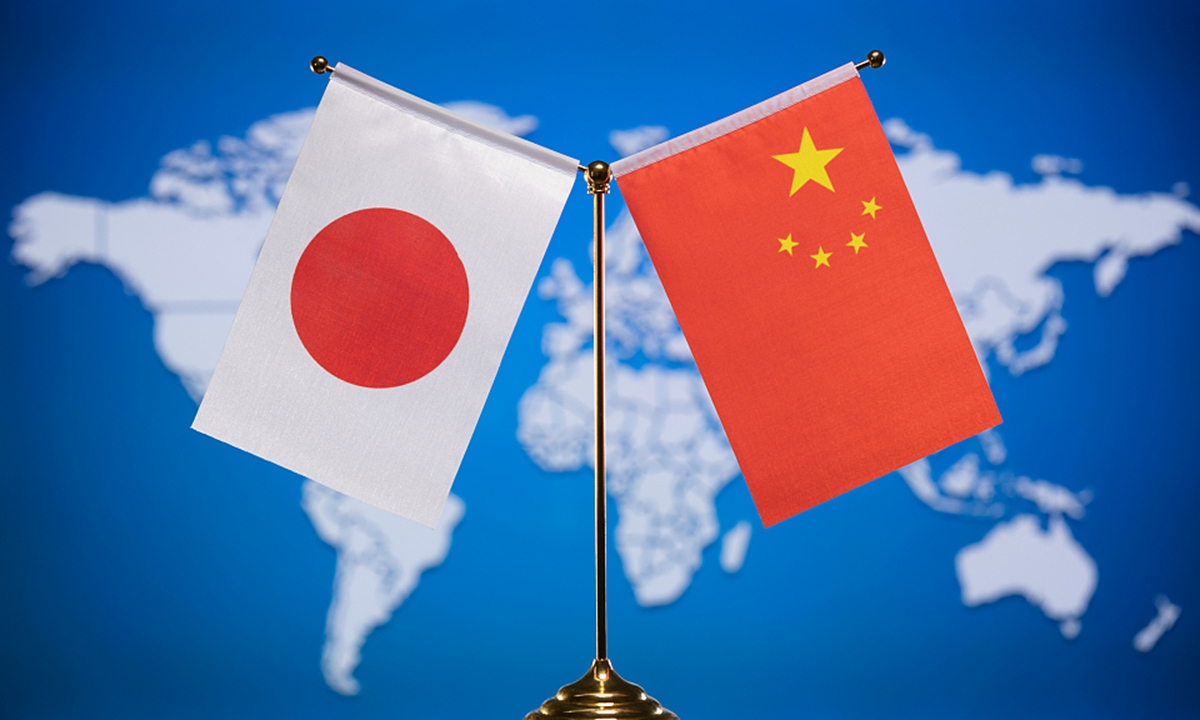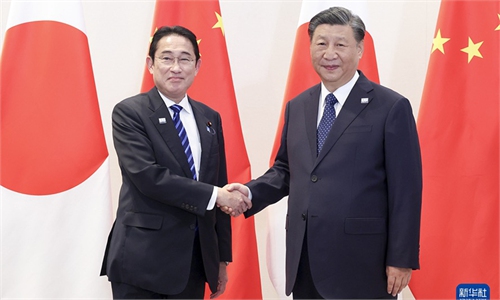
Photo: VCG
The recent meeting between the leaders of China and Japan, held in San Francisco, took place against the backdrop of tensions caused by Japan's discharge of nuclear-contaminated water into the Pacific Ocean. The first face-to-face meeting between the two leaders in a year sends a clear signal of their intention to stabilize relations. Additionally, this year marks the 45th anniversary of the signing of the China-Japan Treaty of Peace and Friendship.
China and Japan share a complex history as close neighbors with similar cultures, but they have also been historical adversaries. While China's biggest geopolitical obstacle comes from the US, it is important to note that Chinese society does not necessarily harbor "hatred" toward the US, despite the power game between the two countries. However, there is a deep-rooted resentment toward Japan among many Chinese people. Japan's sentiment toward China has also reached a historic low, with "anti-China sentiment" spreading within Japan.
The complicated sentiments between China and Japan stem from repeated conflicts in modern times, particularly from Japan's brutal invasion of China during World War II and its massacres of Chinese people. Furthermore, Japan has not yet adequately acknowledged its past wrongdoings.
While historical grievances have not yet unknotted, new tensions are rising. With the emergence of China, the US has gradually come to see China as its primary strategic competitor, and has developed hostile policies as a result. Against this backdrop, Japan has been willingly aligning itself with the US in containing China's rise. Japan has participated in the US-led semiconductor blockade against China, and has publicly said that China represents an "unprecedented security challenge." It has also increased its military spending, again targeting China.
As a result, China-Japan ties have been reshaped. In the past, the two countries have had disagreements over the Yasukuni Shrine, Japan's textbooks, and the Diaoyu Islands. At that time, Japan was unwilling to accept the fact that its economy had been overtaken by China's, and Tokyo wanted to maintain its status as No. 1 in Asia. But now, Japan has become the No.1 strategic tool for the US to suppress China.
If China and Japan continue to perceive each other as enemies, the relationship between the two countries will become irreparable, fueling further resentment and animosity among people from the two sides. That is a scenario the US most wants to see.
China faces the dual challenge of managing relations with both the US and Japan, so it needs strategic wisdom. At the very least, we should strive to prevent China-Japan relations from deteriorating further. In order to achieve this, the public must have the big picture in mind and become more open-minded toward Japan.
While we should confront Japan when necessary, it is equally crucial for China to reassess its neighbor in light of its own rise. This will enable China to develop a more accurate understanding of both countries, facilitate the continuous updating of strategies toward Japan, and maintain precision in decision-making.
Japan has declined, overall. Firstly, Japan's GDP has fallen. While Japan still possesses advanced technologies in areas such as mechanical manufacturing and semiconductors, these industries are shrinking. Take its automobile industry, a core manufacturing sector; Japan's domestic automobile production has long been lower than China's, and this year, China has also surpassed Japan in global automobile exports. Furthermore, China has surpassed Japan in the field of new energy vehicles.
China's industrial system is developing comprehensively. China has made continuous advances in fields such as aerospace and internet technologies. China is also a nuclear power. Today, China is viewed by the world as a "comprehensive superpower," while Japan is perceived as a "little brother" relying on protection from the US.
Japan should not continue to be viewed as a country with which China needs to compete fiercely. We must remember the harm Japan has caused to China and not forget our national humiliation. At the same time, we need to rid ourselves of the psychological shadow that history has cast, or the fear that Japan may harm us again. The era in which Japan could bully China has come to an end, and the foundation of China-Japan relations has been completely reset. The relationship between the two countries also requires redefinition.
Today and in the future, China's approach toward Japan needs to have a new dimension, one that serves China's current and future national interests.
China and Japan have a significant trade relationship, and China remains Japan's largest trading partner. Therefore, we should strive to strengthen the economic ties between the two countries and further expand people-to-people exchanges. In the past, many Japanese movies and TV series were popular in China, and there were also numerous tourists from Japan. However, these situations have changed. Criticizing Japan has become a form of political correctness on the internet. Online photos of individuals wearing kimonos on the street draw heavy criticism, for example. In my opinion, this kind of public opinion environment has gone too far.
China-Australia relations have broken the ice lately, and it is equally important for us to not harbor long-term tension with Japan. Establishing a normal and harmonious relationship with Japan is a complex task, especially given the US factor. It cannot be achieved solely through China's efforts. However, it is crucial to pay attention to this, particularly in terms of reconstruction of grassroots attitudes, which can foster a favorable environment for mutual interaction. China and Japan are and will remain close neighbors. Cooperation benefits both sides, while conflict harms both. We must always bear this principle in mind.
As a patriotic media person, I write these words out of my own sense of responsibility. I hope for understanding and welcome rational discussion.
The author is a media professional. opinion@globaltimes.com.cn


